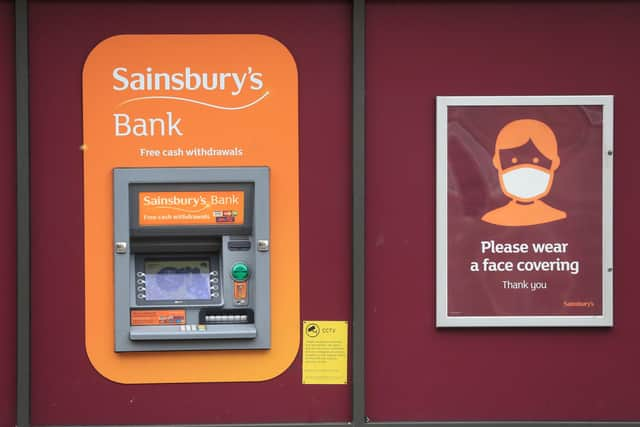Edinburgh job fears as Sainsbury's outlines plans to exit core banking business
and live on Freeview channel 276
Sainsbury’s is embarking on a “phased withdrawal” from its core banking business, in a move that could have a major impact on the Edinburgh-based operation.
The supermarket giant, which also owns the Argos chain, confirmed that it was exploring several options as part of a withdrawal from the banking business under plans to focus its efforts on the retail front. A spokeswoman for the group stressed that it would be “business as usual for now” at the bank, with nothing immediately changing for customers or the products and services on offer. The headcount at the Edinburgh Park-based banking business is not being disclosed and there is no current timeline for how long the exit will take.
Advertisement
Hide AdAdvertisement
Hide AdThe changes are likely to result in products being outsourced to other providers, which it already does with its insurance products, and through which it offers Argos credit cards and loans to about 2.1 million customers. Sainsbury’s Bank currently offers loans, credit cards and savings accounts from its own bank.


Sainsbury’s Bank, which began more than two decades ago as a joint venture between the retailer and Bank of Scotland before Sainsbury’s took full ownership in 2014, has been at the centre of speculation for some time. Takeover talk circulated in late 2020 when the group confirmed that it had received some “very preliminary expressions of interest” in the bank. It decided some months later to retain its Edinburgh-based banking arm after deciding against a sale.
In its latest statement ahead of a February 7 strategy update, the group said: “In order to improve the financial services offered to our customers and consistent with the clear focus on our retail businesses, we are exploring a number of options.
“Financial services products that we continue to offer in the future will be provided by dedicated financial services providers through a distributed model. We already do this successfully with our insurance products. Over time this will result in a phased withdrawal from our core banking business.”
Advertisement
Hide AdAdvertisement
Hide AdSimon Roberts, Sainsbury’s chief executive, said: “We have been clear since we launched our food first strategy in 2020 that we would concentrate our efforts on our core retail businesses and today’s announcement reflects that strategic focus. We will, of course, communicate directly to customers well in advance of any changes to their products and services.”
Sainsbury’s Bank chief executive Jim Brown is set to retire from his role amid the wind-down of the division. He will be replaced by Robert Mulhall, who previously headed up Allied Irish Bank’s UK division, at the end of March to oversee the changes.
Analysts at house brokerage Shore Capital noted: “Sainsbury’s Bank has been a sub-optimal activity from an aggregate capital returns perspective for some time and so, noting a prior sale process that did not yield a satisfactory outcome to the board, we understand and applaud the decision to focus on where the human and financial capital of the group can be applied to better shareholder return in the next phase of the business’ development. The bank has been a drag on group performance and after much reflection the board has taken decisive actions.”
Steve Clayton, head of equity funds, Hargreaves Lansdown, added: “Sainsbury’s offers a book of generally decent quality banking customers all nicely parcelled up, but nobody is prepared to pay to acquire the book, suggesting a lack of confidence in the ability to extract a decent margin going forward. For its part, Sainsbury’s is looking to de-risk its exposures by earning commissions from allowing other firms to sell to the Sainsbury’s Bank clientele.”
Comment Guidelines
National World encourages reader discussion on our stories. User feedback, insights and back-and-forth exchanges add a rich layer of context to reporting. Please review our Community Guidelines before commenting.